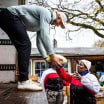Great and pertinent question! I tracked down Bill Burniston, the Canes' head of strength and conditioning and noted
CanesCast
listener and two-time guest, to learn more about how the team best prepares its players for shifting time zones. (He sits behind me on the plane, so it wasn't too difficult.)
Going east to west, he said, wasn't as much of a concern as going in the opposite direction; gaining time isn't as jarring on your internal body clock as losing time. In 2018-19, the Canes flew out to Los Angeles two days prior to the game, but this season, they scheduled a day-before flight, which is the norm in the NHL. If nothing else, that helps to maintain routine (in this case: practice, fly, morning skate, game), and athletes are certainly creatures of habit. And, hey, maybe that worked: The Canes were
shut out 2-0 by the Kings
last season and then flipped the script this time around with Petr Mrazek's 31-save shutout in a
2-0 victory
.
CANESCAST: LOGISTICS OF A ROAD TRIP
The bigger concern for Burniston is traveling back east after Friday's game in Anaheim. With a five-day gap in between games, the thought is to get the team reacclimated to Eastern time as soon as possible. So, the Canes will hop on a red-eye flight immediately following the game and land in Raleigh some time around 6 or 7 a.m. on Saturday.
Red-eye flights, while efficient in a travel sense, present a unique set of challenges. To optimize his plan for the Canes, Burniston consulted with Dr. James Maas, whose
website
describes him as the "leading authority and international consultant on sleep and performance."
Burniston then compiled a document that he will disseminate to players and staff, a list of tips broken down into four sections: pre-boarding, pre-flight, in-flight and day of arrival. Below is a sampling of some the included tips.
Hydration is key prior to boarding (and following a game). Before take-off, it's important to prepare for sleep - avoid caffeine and large, fatty meals, grab a pillow and blanket for comfort, pull the window shade down to avoid light intrusion and use the bathroom before sleeping. During the flight? Sleep as much as possible, blocking out noise with headphones and keeping the cabin as dark as possible. Upon arrival in Raleigh, stay awake for the remainder of the day, if possible. If sleep is necessary, do so upon arriving home, but wake within an hour of normal waking time. Then, get as much natural light as possible and go to bed early.
Win the day!



















